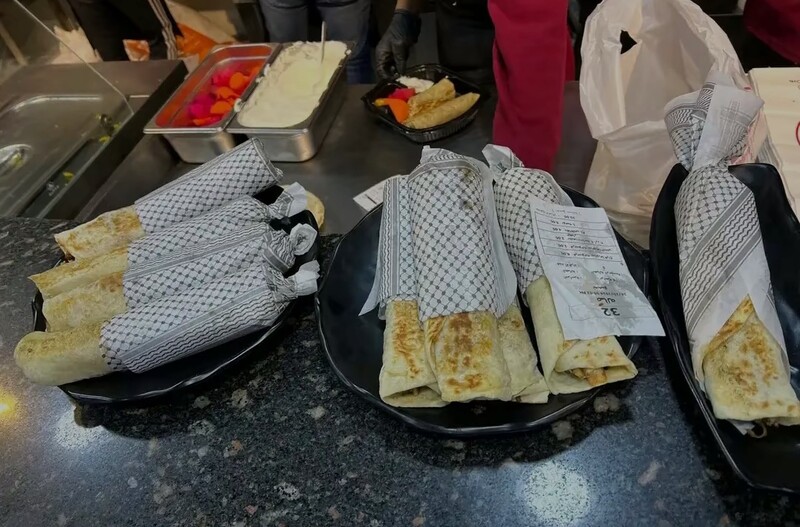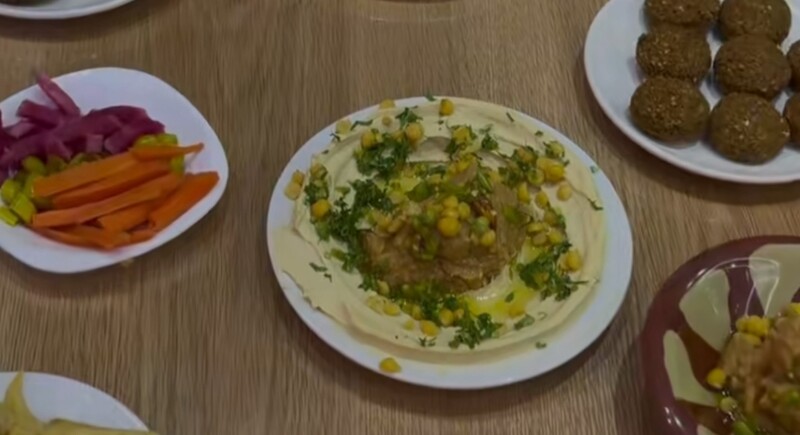The Electronic Intifada 3 April 2025

Shawarma wrapped in paper with the pattern frequently found on the *kuffiyeh*, the Palestinian checkered scarf. (Reem Sleem)
When I was displaced from Gaza to Egypt on 19 February last year, I realized that loss was not just about the home we left behind or the universities and schools destroyed, preventing those of us who were students from continuing our education at home. It was also about the small daily details that were part of our identity and culture, such as the food we love and the restaurants in which we gathered with family and friends.
I am one of the many who crave Palestinian shawarma, known as farshouha. I used to eat it regularly.
My father never had breakfast without falafel, fava beans and hummus – a staple meal for many families in Gaza.
My mother loved saj bread so much that she never stopped making it, even during the Israeli attacks. She would bake it in a clay oven when flour was scarce and overpriced due to the genocide.
Before the war, it was our tradition at the beginning of every month, when my father received his pay, to eat lunch at one of our favorite restaurants. We loved al-Omda, al-Maliki and Milano.
Afterward, we would head to Kazem or Hamada for their beloved ice cream and other desserts.
During my university breaks, I often went with my friends to a place called al-Hafra (The Pit).
We would enjoy toasted cheese sandwiches with fresh juice or just sip coffee and spend time together. This restaurant was located near the university in the Netzarim area, but like most of Gaza’s restaurants, it is now nothing but rubble.
Ironically, the restaurant’s name became a tragic reality as it truly turned into a pit of debris and ashes.
The Egyptian flavor
In Cairo, everything is different, even the food. While some dishes resemble Palestinian ones, they carry a different flavor.
One time, I craved Nabulsi knafeh. My father finally found it at a well-known sweet shop called Kunafa and Basbousa, which is also the name of two popular desserts.
It looked the same — orange in color, with familiar ingredients — but it tasted completely different. That was the moment I realized that those of us who have left Gaza might never taste our favorite types of food again.
Even if we return to Gaza one day, the restaurants are gone, and rebuilding them could take years.
Our heritage is at risk of disappearing.
Despite all these losses, the resilience of my people remains unshaken. The Israeli occupation and military attacks could not erase our identity.
While speaking on the phone last October with a friend who was also displaced to Cairo, she told me about some people from Gaza who refused to surrender. They challenged adversity and exile by opening Palestinian restaurants, bringing the flavors of home with them.
A mix of amazement, joy and curiosity filled me, and I decided to embark on a journey to Nasr City, east of Cairo, to visit some of the restaurants, meet their owners and try their offerings.
Despite having only temporary resident permits, Palestinian entrepreneurs have established at least 15 restaurants and cafes serving shawarma, falafel, chickpea fatteh with olives, coffee and.sage tea.
This cluster of eateries highlights the emerging Palestinian community in the Nasr City area.
In a small corner off Ahmed Qasim Joda Street, the aroma of freshly fried Palestinian falafel transports customers back to Gaza. Majed al-Khozendar, who once owned a chain of Gaza restaurants, now stands behind the counter of his new falafel shop in Nasr City, serving the taste, including garlic, onions, coriander, cumin and parsley, of home to a growing crowd.
I was filled with pride as I watched my compatriot rise from the ashes to rebuild his dream.
Majed told me that the Israeli attacks had destroyed all three of his restaurants in Gaza, as well as his five-story home. With no shelter and no future left in his homeland, he decided to leave.
After paying $25,000 to a travel agency, Majed arrived in Egypt in February 2024, along with two of his sons, their wives and a small grandson.
He then opened a traditional Palestinian restaurant in Nasr City. The menu includes hummus, fava beans, falafel and chickpea fatteh.

Hummus and other delights served in Egypt’s Nasr City. (Reem Sleem)
Majed serves Egyptian and Palestinian customers and those from elsewhere.
Sanaa Shwiek, a 26-year-old software engineer, was eating chickpea fatteh when I visited in April 2024. “It’s delicious. It reminds me of my days in Gaza,” she said.
Another customer, Nabilla Muhammad, an Egyptian woman, called the hummus incredible.
“I’ve never tasted anything like it before,” she said, welcoming me to Egypt and calling it the second home for Palestinians.
Majed al-Khozendar, the restaurant’s owner, had visited Cairo before the October 2023 attacks in Gaza.
“I never felt like a stranger here,” he said. “But I miss my homeland and the rest of my family who stayed behind. I hope to reunite with them once the Rafah border crossing opens.”
Israel ordered the vital crossing closed again on 2 March this year.
Deep ache
At Hay al-Rimal restaurant, Palestinians were chatting in their Gazan dialect while eagerly enjoying shawarma wrapped in paper resembling the Palestinian checkered scarf or kuffiyeh.
A smiling waiter served dishes with a Palestinian flag printed on the sleeve of his crimson-colored shirt.
As I took my seat, a smile spread across my face. Finally, I would taste real Palestinian shawarma again!
When I took my first bite, I closed my eyes. The flavor was familiar, but it carried a deep ache.
For a brief moment, I felt as if I were back in Gaza and that the Israeli genocide had been nothing but a bad dream. Life filled my soul again, if only for a few fleeting seconds, before I opened my eyes and was reminded of my reality.
Sadly, I was in Cairo, and exile loomed despite the warmth of the taste.
Basem Abu Aoun, the owner of Hay al-Rimal, once operated two branches of a restaurant called Turki in Gaza, both of which have been reduced to rubble.
With little money left, he departed Gaza in January 2024 seeking to rebuild his life. He opened Hay al-Rimal in Cairo less than four months after arriving.
“I lived in al-Rimal [a neighborhood in Gaza City] before it was destroyed. That’s why I named my restaurant after it,” he told me.
Basem explained that opening the restaurant was a risk and that he had considered using his savings to survive for a year instead. But he took a leap of faith, believing that “livelihood is in God’s hands.”
It turned out to be the best decision he ever made, he said, as the restaurant has become a major gathering place for Palestinians in Cairo.
When I asked if he planned to return to Gaza, he answered: “We are waiting eagerly for Gaza to reopen. Gaza is in our hearts. We will never forget it, and we will return, God willing.”
His son, Abdullah, added: “All our restaurants in Gaza were destroyed, and our home was bombed, but we will return. We will rebuild and come back stronger than ever.”
Egyptian customer Amr Sharif praised the Hay al-Rimal restaurant’s turkey shawarma.
“The spices give it a unique taste, different from what I’m used to, but even better,” he said. ”The bread is soft and delicious. I love it, and I’ll order another one!”
Bashar Muhammad, 26, ate a hot chicken shawarma meal at the restaurant and said its presence, along with the other eateries “builds a Palestinian community that also reminds him of the spirit and beauty of Gaza.”
Gaza Saj Bakery
My last stop on the culinary tour was Gaza Saj Bakery, which I was told was the first Palestinian one in Egypt. I longed to buy saj bread so I could make musakhan with my mother, a dish featuring roasted chicken we hadn’t eaten since the Israeli attacks began.
The smell of freshly baked bread was intoxicating. Overwhelmed with joy, I took a bite of warm saj bread straight from the oven.
There were other types of bread, such as Iraqi bread, wheat bread and rye bread that I had not expected to see again, served at the restaurant.
Gaza Saj Bakery’s owner, Nael Arafat, said he opened in September 2024 with his brother, Mahmoud. They rented a small shop, painted it white, designed a logo and started advertising on social media. Their bread quickly gained popularity among Egyptians.
Nael sends some of what he earns from the bakery to the rest of his family still in Gaza and hopes that he will be able to open other branches in Egypt.
When I asked him about his desire to return to Gaza, he expressed despair, saying: “It is difficult to return to Gaza, as it has become unlivable. That is why I decided to establish my life and settled here.”
I was standing next to a man waiting for the Iraqi bread order to be ready.
“The bread remains fresh for a long time and because of this, I became accustomed to asking for it,” he said.
He then gave me some of the bread he had ordered as a gift, expressing solidarity and love for Palestinians. It was a nice experience, and I felt grateful to him and all the Egyptians who welcomed me to their country.
My Cairo experiences made me realize anew that food for Palestinians is not just a meal or part of one, but also part of the memories that we carry with us wherever we go. In each meal, there is a story about steadfastness, about love for a homeland that still burns inside us despite everything that has happened.
Reem Sleem is a writer from Gaza who has been displaced to Egypt.





